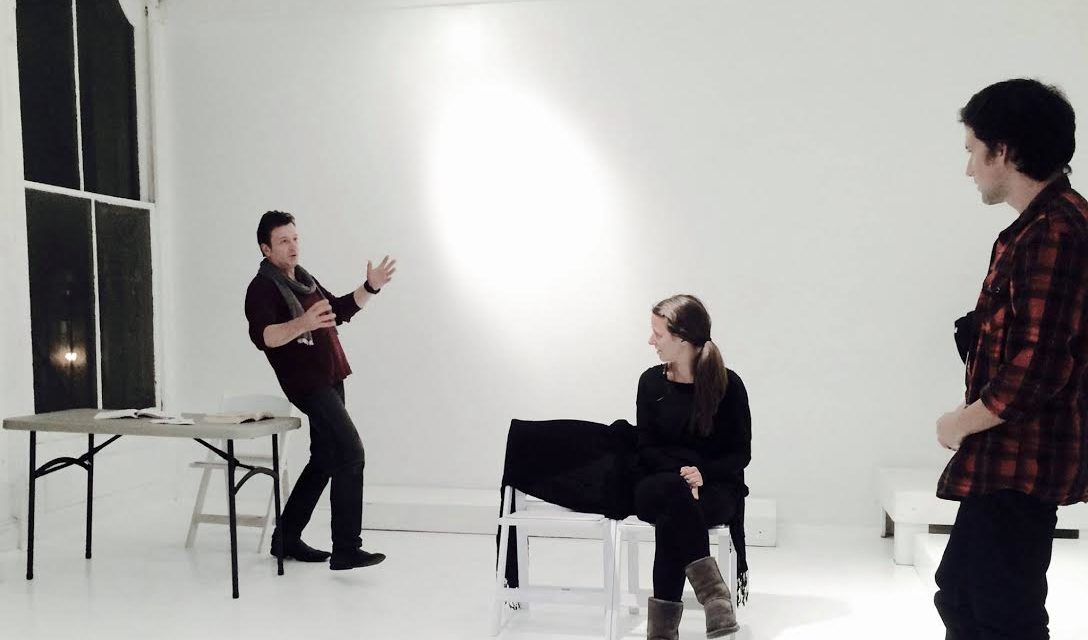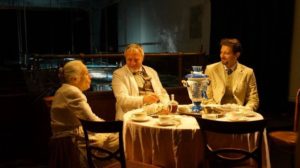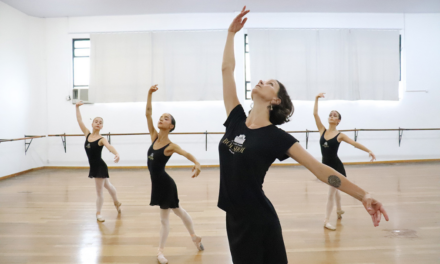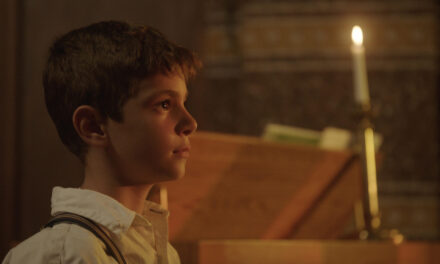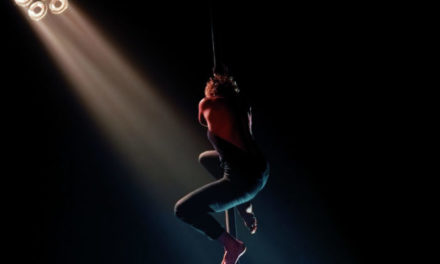On March 24, The Russian Arts Theater and Studio will launch its first annual New York Chekhov Festival with an English-language production of Three Sisters and a Russian-language production of Swan Song (Про Великое Ничто). Artistic Director Aleksey Burago founded the theater and studio in 2004. He is a graduate of the Moscow Academy of Theater Arts (GITIS), where he belonged to director Petr Fomenko’s first class of students. I spoke with Mr. Burago and Managing Director and actress Di Zhu about the connections between Russian and American theater traditions, performing Chekhov in New York, and the role of ethics in theater training. Here are excerpts from that conversation.
AS: Perhaps you could begin by telling me about how you came to found your studio and how you began working with actors in New York.
AB: I came here twenty years ago. I was invited here after doing a show at the Hermitage Theater. When you come here to live, the story becomes very different. You have to start from the very beginning. I came and I could not live without theater. Fomenko infected me for the rest of my life—You’re not poisoned by it, but you have to express yourself through that form of art. This is when I have felt most alive. So I started looking for people who shared the same ideas as me. I started teaching regularly, and I found that people came (laughs). I think we’ve already done more than thirty shows here.
AS: If you look back at your training as a director and an actor with Fomenko, what would you say you have brought from that training to bear upon your practice in New York?
AB: I was lucky. I was one of his first students and in his first class ever in GITIS. He was a very interesting man, full of contradiction, but what was important about him is that he had light. He was a good, kind person. We made a film together based on a show that I directed with our students, Queen of Spades. I directed it and played Hermann. He taught me how to see angle. I had never thought about angle. Angle of form, and angle of light—and that, kind of, there is a God (laughs). I later started studying Chekhov—I didn’t like studying Chekhov in Russia, but he certainly became very important here. Chekhov is often misunderstood here.
AS: Why do you think Chekhov is misunderstood in the United States?
AB: Because American culture is heavily based on language. [Americans] communicate through clarity of language, and they believe what they say very often. But in Chekhov nothing is true.
AS: Irony is certainly a big part of contemporary American culture, but American irony is quite different than Chekhovian irony…
AB: Which we discussed a lot, because we are fighting cynicism. Cynicism is the base of New York theater. Cynicism—sometimes light, sometimes heavy— and sarcasm. Chekhov talks about respect and sincerity. So in a way we are kind of fighting cynicism and hate cynicism as a cultural phenomenon.
AS: How would you differentiate Chekhov’s sense of irony from American cynicism?
AB: You can see it in his notebooks and his letters. Chekhov’s irony is based on looking for God. God is different for every person. As he said in one of his letters, it’s the personal responsibility of every person to find his own God, his own light. Fomenko was talking about the same thing without even reciting Chekhov. It was a parallel between them as great artists because they are looking for… (laughs) looking for God. And it’s very inspiring in a way.
AS: Fomenko in some ways had it easy, because Chekhov wrote in Russian. How are you performing Chekhov in English?
AB: What I’m trying to do right now, it’s…I’ve never seen it, though it’s obvious. With Three Sisters and Chekhov what I’m trying to do is some kind of connection to Trinity, to [Andrei] Rublev’s Trinity, and it is an obvious connection (laughs).
AS: Say something more about that.
AB: I think we started doing it because of the political unease in the country. It is so bad right now, and only Three Sisters makes the vibration of the time. Everything is unfair that is happening in politics. It brings up the question: where is the fairness? Where is justice? It seems like only around the three sisters could they happen. When the three sisters are together, they have a good time, even though everything around them is collapsing.
DZ: The times are changing, and they have to figure out how to survive in this world outside of their house.
AB: In a way, I would say we chose it for New York, for America, because we sense that it is just hard to survive. You feel so angry with everything around you, so you need to find some hope and light. And because I love Chekhov, the Chekhov who works here, in America. In Russia, I saw [Eimuntas] Nekrošius’s Three Sisters, which I liked, but there it is a different kind of life, with different vibrations around you…And this is what we are trying to express. Of course, we haven’t finished yet. We’re still working on it. But Three Sisters for me— it is an ironical take on Trinity. They are Three Graces, not three siblings.
AS: Much of what is meaningful in Chekhov seems to come from moments of recitation and reference. How do you maintain those gestures when the audience won’t necessarily pick up on them?
AB: Chekhov brings in a lot of musical phrases, from romances, from songs, from poetry, which were funny by that time. It is Pushkin, it is Lermontov. What’s beautiful about theater is that it is not the reference that I remember but the reference that you know…What is cool about Three Sisters is that the sisters make references ironically based on intelligence. Natasha cannot get it. She wants to get it like everyone else in the audience. She wants to become one of them. She wants to be the fourth sister, I believe, but she cannot get it, even though she has good intentions. She is missing something. She is missing art. She is missing compassion.
Three Sisters reminds me of [Tarkovsky and the Strugatsky Brothers’] Stalker. It reminds me of the room that fulfills your desires. And Natasha fulfills her desires! She comes and she gets what she wants. The three sisters have a magic, some kind of magical aura around them—Like they say in the beginning: when we are unhappy it is raining and snowing, when we are happy it is sunny and blooming. It is the mystery of the play. And it has been uplifting me somehow (laughs), and I want to find an adequate expression of that, to invite people, to lure people into that house where your secret desire could be fulfilled.
AS: Is the cast for Three Sisters drawn exclusively from your studio?
AB: We tried to build a cast. I prefer to work with people I know. For us, theater ethics are very important. We build special relationships based on what you think is ethical to the message and towards each other. It’s very hard to explain, and it takes time to explain. You explain it through training.
AS: How have you come to your philosophy about cast building?
AB: Everyone who studied in theater school in Russia got it because it was Stanislavsky’s idea. It starts with the wardrobe. I remember Fomenko was offering our class to make a theater, but we were not a theater. We were a company of individuals. He started it in the next class with the Kutepova sisters. I remember I came, and I saw that he was already building a theater. He didn’t talk about it then, but he was obviously building people who could go together in a space. You could see that. He wasn’t taking talent by talent. He was taking talent that fit in a family.
DZ: That is sort of our philosophy as well. We teach with the objective of having actors that could fit within our theater repertoire, people who genuinely care not just for their individual careers but also for the projects and for each other, as corny as that sounds. When we started the studio, we wanted to incorporate theater ethics into the training, which is not really talked about.
AS: What would you put at the center of your ethics of actor training and theater?
DZ: I think being open is one of the key things. You have to be open to others and open about yourself. Any kind of negativity is destructive to the whole creative process. And it comes from small things as well, like having respect for your props, your costumes.
AB: In our school there was a famous exercise to move furniture around. In the first class at GITIS or any school based on the Stanislavsky method, they asked, “Move your chairs. Okay, now move your chair with no sound.” This is easy to teach. The most difficult stuff to teach is how to transfer any irritations which are part of the work into the work. If I feel irritated, I transfer irritation into sensation. Even sometimes irritation for which I cannot find a word I can translate into something creative, a creative art. You cannot explain it by hand, because it is based on contradiction.
Fomenko himself was full of contradiction. But it was part of the game. The game of rehearsal is in contradicting yourself. Fomenko was so full of contradiction that he was himself like an art. It was a pleasure to watch him. He was a combination of conflicting events and ideas. He would say he wanted things and the next time he would deny it by doing something opposite. And it was a charm, because he was producing a sense of love to the people around him. When you knew him closely, he was so warm…He couldn’t explain actually very often what he was [about], but he could make it. Theater is an art form. You can’t explain an art form. You have to do it.
DZ: There is that sort of mysticism around it. Something magical.
AB: It’s magic. Not mysticism, but magic. He was a magical person. He made magic out of nothing, from energy between people, and very often through body talk.
DZ: That is the one difference that I see between Russian theater and American theater—I don’t think the actors here give as much power to the director as they do in Russia. I think it’s a different culture here and a different way of working, where directors are just sort of overseeing, and in Russian theater the director is really the hand of the show. And that’s another thing that we wanted to do, was to train students who are able to take direction. [As an actor] you have this responsibility to deliver the vision of the director. That’s part of the ethics as well. Aleksey really has a vision carved out, and he tries to mold each actor to fit that vision, instead of the other way around.
AB: Fomenko said, look, I don’t know how to train you. Watch me working.
AS: Do you think you have been successful in creating some kind of theater family in your studio?
AB: We cannot live without that.
DZ: Some people we have been working with for a long time—almost ten years. In Three Sisters most cast members are like family members. They have done many productions with us. When we find a new cast member, the first question is— is he a good actor (laughs), but the second one, which is equally important, is— how well will he fit with the group? Will he be able to collaborate? That’s one of the most important questions. As you said, Aleksey, you can’t do Chekhov without a family.
AB: Aleksey Popov said it, even in Stalin’s time. But it is interesting. Chekhov is coded. Everything is coded in his work. If you read his plays, and you don’t know his short stories, or you’ve never read about him, you’ve never read his letters, you’ll never find out what he meant, because it’s coded, it’s a code.
The cast of Three Sisters includes Reanna Armellino, Boris Brownstein, Hazen Cuyler, Michael Donaldson, James Fordyce, Roman Freud, Toni Goldman, Ekaterina Golovina, Ariel Polanco, David A. Russell, Jo Anne Sellers, John Trujillo and Di Zhu. It runs through April 14. Swan Song (Про Великое Ничто) stars Ernst Zorin and Gala Orlovsky, with live music by Di Zhu. It runs through April 15. Both shows will be performed at the Balcony Theater at West Park Presbyterian Church.
This post was written by the author in their personal capacity.The opinions expressed in this article are the author’s own and do not reflect the view of The Theatre Times, their staff or collaborators.
This post was written by Adrien Smith.
The views expressed here belong to the author and do not necessarily reflect our views and opinions.

